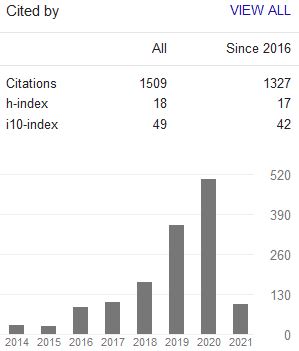ISLAM, POLITICS AND IDENTITY IN WEST SUMATRA
Abstract
Keywords
Full Text:
PDFReferences
Abdullah, Taufik. “Adat and Islam: An Examination of Conflict in Minangkabau.” Indonesia 2, no. 1 (1966): pp. 1-24.
----------. Schools and Politics: the Kaum Muda Movement in West Sumatra (1927-1933). Ithaca, N.Y: Cornell Modern Indonesia Project, Cornell University. 1971.
----------. “Modernisation in the Minangkabau World: West Sumatra in the Early Decades of the Twentieth Century.” in Holt C. (ed.), Culture and Politics in Indonesia.Ithaca: Cornell University Press, 1972.
----------. “Islam, History, and Social Change in Minangkabau.” Thomas L.L. and Benda-Beckmann, F.V. (eds). Change and Continuity in Minangkabau: Local, regional and Historical Perspectives on West Sumatra. Athens, Ohio: Ohio University Centre for International Studies, 1985.
Al-Attas, S.M.N. Preliminary Statement on a General Theory of the Islamization of The Malay-Indonesian Archipelago. Kuala Lumpur: Dewan Bahasa dan Pustaka. 1969.
Andaya, L.Y. “Aceh’s Contribution to Standards of Malayness.” Archipel, 61, no. 1 (2001): pp. 29-68.
Azra, Azyumardi. Jaringan Global dan Lokal: Islam Nusantara. Bandung: Mizan. 2002.
----------. The Origins of Islamic Reformism in Southeast Asia : Networks of Malay-Indonesian and Middle Eastern ‘Ulama in the Seventeenth and Eighteenth Century. Honolulu: University of Hawaii Press, 2004.
Benda, H.J. The Crescent and the Rising Sun: Indonesian Islam under the Japanese Occupation. The Hague: W. van Hoeve. 1958.
Biezeveld, R. ‘The Many Roles of Adat in West Sumatra.’ in J.S. Davidsonand D. Henley (eds). The Revival of Tradition in Indonesian Politics: the Deployment of Adat from Colonialism to Indigenism. London, New York: Routledge. 2007.
Blackwood, E. “‘Representing Women: The Politics of Adat Minangkabau Writing.” The Journal of Asian Studies, 60, no. 1 (2001): pp. 125-149.
Colombijn, F. Paco-paco (kota) Padang: Sejarah Sebuah Kota di Indonesia pada abad ke 20 dan Penggunaan Ruang Kota. Yogyakarta: Penerbit Ombak, 2006.
Dobbin, C. Islamic Revivalism in a Changing Peasant Economy: Central Sumatra, 1784-184. London: Curzon Press, 1983.
Drakard, J. A. Malay Frontier: Unity and Duality in A Sumatran Kingdom. New York: Southeast Asia Program Cornell University, 1990.
Federspiel, H.M. Persatuan Islam, Islamic Reform in Twentieth Century Indonesia. New York: Ithaca Cornell University, 1970.
----------. Localising Power in Post-authoritarian Indonesia: A Southeast Asia Perspective. Stanford: Stanford University Press, 2010.
Hadler, J. “A Historiography of Violence and the Secular State in Indonesia: Tuanku Imam Bondjol and the Uses of History.” The Journal of Asian Studies, 67, no. 3 (2008a): pp. 971-1010.
----------. Muslims and Matriarchs. London: Cornell University Press, 2008b.
Howell, J.D. “Sufism and the Indonesian Islamic Revival.” The Journal of Asian Studies, 60 no. 3 (2001): 701-729.
Jaspan, M.A. “In Quest of New Law: The Perplexity of Legal Syncretism in Indonesia.” Comparative Studies in Society and History, 7, no. 3 (1965): pp. 252-266.
Johns, H. “Sufism as A Category in Indonesian Literature and History.” Journal of Southeast Asian History, 2, no. 2 (1961): pp. 10-23.
Kahane, R. “Religious Diffusion and Modernisation: A Preliminary Reflection on The Spread of Islam In Indonesia and Its Impact on Social Change.” European Journal of Sociology, 21, no. 1 (1980): pp. 116-137.
Kahin, A. “Some Preliminary Observation on West Sumatra during the Revolution.” Indonesia, 18 (1974): pp. 76-117.
----------. Rebellion to Integration: West Sumatra and the Indonesian Polity. Amsterdam: Amsterdam University Press, 1999.
Laffan, M. Islamic Nationhood and Colonial Indonesia: The Umma Below the Winds. London and New York: RoutledgeCurzon, 2003.
Leirissa, R.Z. PRRI Permesta: Strategi Membangun Indonesia Tanpa Komunis. Jakarta: Pustaka Utama Grafitti, 1991.
Manan, I. “A Short History of Minangkabau.” in A. Summerfieldand J. Summerfield. Walk in Splendor: Ceremonial Dress and the Minangkabau. Los Angeles: UCLA Fowler Museum of Cultural History, 1999.
Milner, A.C. “Islam and Malay Kingship.” Journal of Royal Asiatic Society, 113 (1981): pp. 46-70.
Noer, Deliar. The Modernist Muslim Movement in Indonesia 1900-1942. Kuala Lumpur: Oxford University Press, 1973.
Oki, A. Social Change in the West Sumatran Village: 1908-1945. 1978. Available at: http://hdl.handle.net/10086/16895, accessed on 12 February 2010.
Reid, A. “Understanding Melayu (Malay) as a Source of Diverse Modern Identities.” Journal of Southeast Asian Studies, 32 (2001): pp. 295-313.
----------. An Indonesian Frontier: Acehnese and Other Histories of Sumatra. Singapore: Singapore University Press, 2005.
Roff. W. The Origins of Malay Nationalism. New Haven: Yale University Press, 1964.
Trimingham, J.S. The Sufi Orders in Islam. Oxford: Oxford University Press, 1998.
Utrecht, E. “The Muslim Merchant Class in the Indonesian Social and Political Struggles.”Social Compass, 31, no. 1 (1984): pp. 27-55.
van Dijck, C “Islam and Socio-Political Conflicts in Indonesian History.” Social Compass, 31, no. 1 (1984): pp. 5-25
Vickers, A. A History of Modern Indonesia. Cambridge: Cambridge University Press, 2005
Voll, J. “Foreword.” in J.S. Trimingham (ed.). The Sufi Orders in Islam Oxford: Oxford University Press, 1998.
Woodward, M. Islam in Java: Normative Piety and Mysticism in the Sultanate of Yogyakarta. Tucson: University of Arizona Press, 1989.
DOI: 10.15642/JIIS.2013.7.1.96-118
Refbacks
- There are currently no refbacks.
Indexed by:
Journal of Indonesian Islam (ISSN 1978-6301 and E-ISSN 2355-6994) is published by the Postgraduate Program (PPs) and the Institute for the Study of Religion and Society (LSAS), State Islamic University (UIN) of Sunan Ampel Surabaya.
Journal of Indonesian Islam by http://jiis.uinsby.ac.id/index.php/JIIs/index is licensed under a Creative Commons Attribution-ShareAlike 4.0 International License.
Copyright ©2020 State Islamic University (UIN) of Sunan Ampel Surabaya. Powered by Public Knowledge Project OJS.







